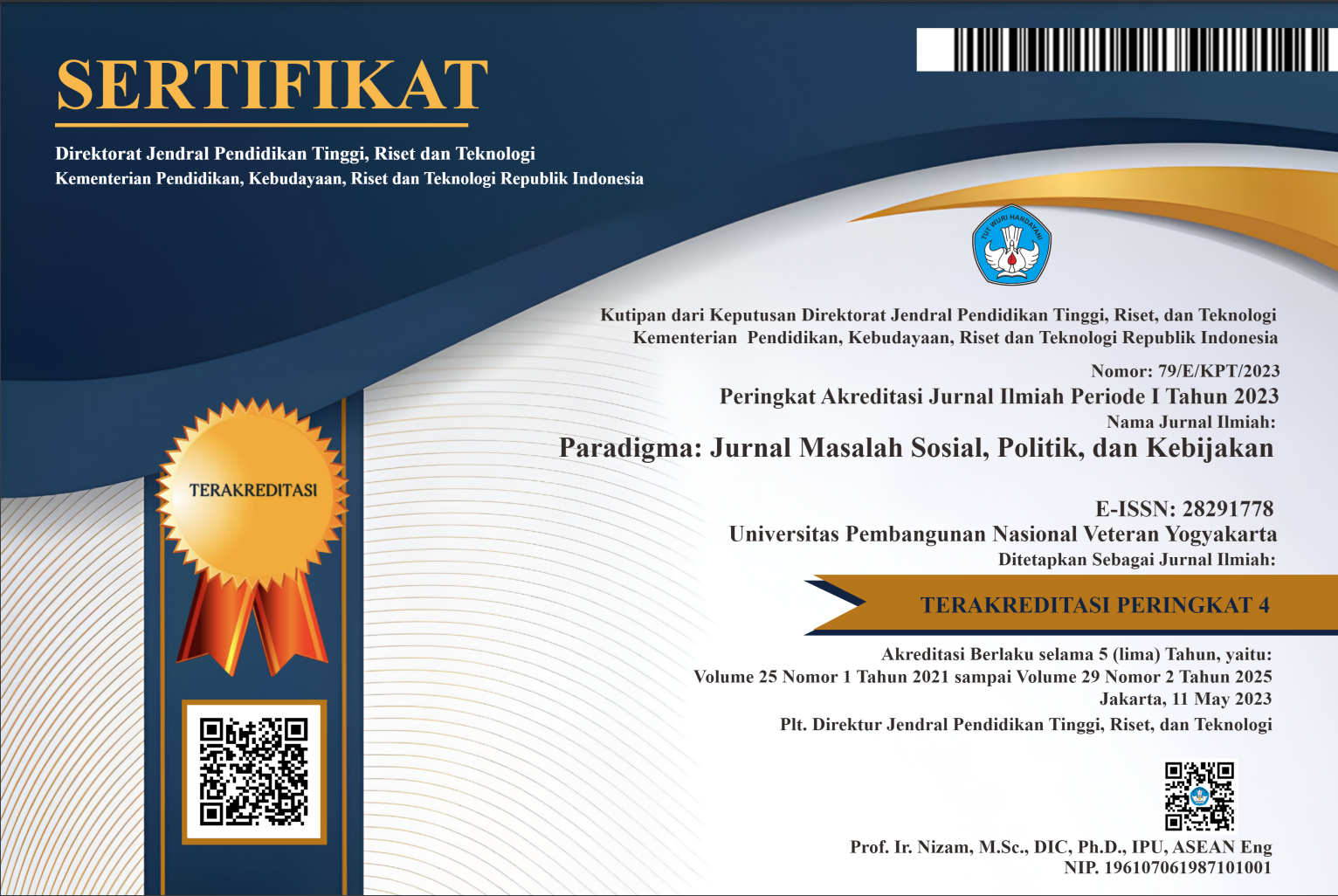| 1. | The manuscript is written in Bahasa Indonesia or English, including research outcomes, field research or literary research, and articles reflecting sociopolitical phenomena. |
| 2. | The manuscript is typed using Microsoft Word program on A4 size, around 4,000-6,000 words in Times New Roman (TNR) size 12 pts and 1.15 space. |
| 3. | The writing system for research outcome consists of: |
| | Title |
| | The title should not exceed 12 words; it should be clear, concise, and informative. Abbreviations should be avoided. |
| | Name of the author |
| | The name of the author is written without any academic degree, followed by the name of the author’s institution, located under the title of the article. In case a manuscript is written by a team, the editor is only in contact with the main author or the first mentioned. The main author must include his/her correspondence address or email. |
| | Abstract with keywords |
| | The length of the abstract is around 200-250 words, while the limit of keywords is 3-5 words. The abstract, at the least, must contain the aim, methods, and results of the research. |
| | Introduction |
| | The introduction should contain (sequentially) the general background and research question or hypothesis. If there is a literature review, it can be included in this chapter. The study objective should be written at the end of the introduction. |
| | Methods |
| | The research methods should elaborate on the method utilized in addressing the issues including the method of analysis. It should contain enough details allowing the reader to evaluate the appropriateness of methods as well as the reliability and validity of findings. |
| | Results |
| | The author should explain the results of the research (what was discovered) in detail. |
| | Discussion |
| | The research result and discussion section contain the results of the research finding and their ensuing discussions. The finding acquired from the results of the conducted research should be written with the supplementary support of adequate data. The research results and findings should be able to resolve or provide explanations to the question stated in the introduction. |
| | Conclusion |
| | The concluding statement should contain a summary and suggestions. The summary should exemplify the answers provided to the hypothesis and/or research objectives or acquired findings. The summary should not contain a repetition of research results and discussions, and it should instead contain a summation of research results and findings as expected in the research objective or hypothesis. The suggestions should present matters that will subsequently be conducted in relation to the research’s ensuing concepts. |
| | References |
| | All references cited in the text of the article should be written in the bibliography section. It should include references obtained from primary sources (consisting of scientific journals amounting to 80% of the entire bibliography) that have been published in the last 10 (ten) years. The remaining 20% may include research articles or research reports (thesis, books, and other relevant publications). |
| 4. | The manuscript is to be submitted directly to http://jurnal.upnyk.ac.id/index.php/paradigma/index by creating a user account as an author. |
| 5. | Tables and figures must have titles and have clear numbers and sources, and be typed in single space. |
| 6. | The list of references only contains referred sources, and all referred sources must be mentioned on the list. Reference sources consist |
| | of, at the least, 80% of literature published in the last ten years. The reference sources in the form of research articles in a journal or a research report (including undergraduate theses, master theses, dissertations, books, and other relevant publications). |
| 7. | All references mentioned should be written down in reference using American Psychological Association (APA) style and arranged from A to Z. |
| 8. | Check each referred article for accuracy and make sure every quoted work in the article is written in References. Works that are not cited but mentioned in References will be omitted by the editor. |
| | Books |
| | Abraham, L. (2010). National Defense. Jakarta: Cendekia. |
| | Book chapter |
| | Smith, F. M., & Jones, W. (2011). The college student. In C. Wood & M. Meyer (Eds.), Cross-cultural education (pp. 75- |
| | 105). London, Canada: MacMillan. |
| | Journal Article |
| | Lee, K. (2014). Reading and learning strategies: Recommendations for the 21st century. Journal of Developmental |
| | Education, 28(2), 2-15. |
| | Journal article with DOI |
| | Kusumaningrum, D. (2017). Interdependence versus truth and justice: lessons from reconciliation processes in Maluku |
| | Paradigma: Jurnal Masalah Sosial, Politik, dan Kebijakan, 20(1), 15. doi: 10.31315/paradigma.237 |
| | Smith, G. (2012). Barthes on Jamie: myth and the tv revolutionary. Journal of Media Practice, 13, 3-17. |
| | doi: 10.1386/jmpr.13.1.3_1 |
| | Journal article on website |
| | Austin, D. (2009). Fatty acids, breastfeeding and autism spectrum disorder. E-journal of Applied Psychology, 5(1), |
| | 49-52. Retrieved from http://ojs/lib.swin.edu.au/ |
| | Newspapers article |
| | Fung, M. (2006, December 12). Asthma rates increasing. Winnipeg Free Press, pp. C4. |
| | Newspaper article on website |
| | Harris, M. (2011, August 16). Grades improve if classes start later, studies find. The Calgary Herald. |
| | Herald. Retrieved from http://www.calgaryherald.com/ |
| | Website |
| | Buzan, T. (2007). Mind maps. Retrieved September 3, 2009, from http://www.buzanworld.com/Mind_Maps.ht |
| | Website document |
| | TransCanada. (2006). Annual report. Retrieved from http://www.transcanada.com/investor/annual_reports/2006 |
| | /media/pdf/TransCanada_2006_Annual_Report.pdf |
| | Book translation |
| | Mancusa, S., & Viola, A. (2015). Brilliant green: The surprising history and science of plant intelligence (J. Benham, |
| | Trans.). Washington, DC: Island Press. |
| 9. | All manuscripts are anonymously studied by reviewers appointed by the editor according to their expertise. The author is given a chance to revise the manuscript based on the reviewer’s or the editor’s recommendation/advice. The decision |
| | of publication or rejection will be informed through the author’s email address. |
| 10. | The editor has the right to modify and correct the spelling, writing, and grammar of the published manuscript. |
| 11. | Everything related to citing permission or computer software usage in writing the manuscript or any other things related to copyright done by the author, along with all its legal consequences, becomes the author’s full responsibility. |
| | |



